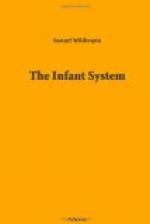And now, as to a matter on which there is some difference of opinion, viz., whether women are or are not as fit for conductors of infant schools as men; my decided opinion is, that alone they are not. There should be in every school a master and a mistress. In the first place, in an infant school, the presence of the man, as of a father in a family, will insure a far greater degree of respect and attention on the part of the children. This does not arise from the exercise of any greater degree of harshness or severity than a mother would be capable of using; nor is it to be attributed, as some suppose, to the less frequent presence of the father in the case of many families, but is rather to be accounted for by an intuitive perception of the greater firmness and determination of the character of the man. To those who deny this, I would give as a problem for solution, a case by no means unfrequent, and which most of my readers will have witnessed,—a family in which the mother—by no means incurring the charge of spoiling the child, by sparing the rod—is less heeded, less promptly obeyed in her commands, than a father who seldom or never makes use of any such means. The mother scolds, threatens, scourges, and is at last reluctantly and imperfectly obeyed; the father, either with reference to his own commands, or seconding those of the mother, speaks, and is instantly regarded. The idea of disputing his authority, or neglecting or disobeying his laws, never once enters the minds of his children. Exactly the same is it in an infant school,—the presence of a man insures attention and gains respect from the children, not only at first, whilst the novelty of such control might be supposed to operate, but permanently; as I am sure all who have candidly examined the schools where two women preside, and those conducted by a man and a woman, must have seen.
Another objection to the sole government of females (I mean the class of females who are likely to accept such situations) in these schools, is, they have not the physical strength, nor, at present, intellectual powers, sufficient for the task. In saying thus, I trust I shall not be suspected of wishing to offend my fair countrywomen. That they have not sufficient physical strength is the intention of nature; that they are deficient in mental energy is the defect of education. I trust, therefore, that no offence will be assumed where no blame is attached. It has been a point much disputed, whether there be really an original and intrinsic difference in the mental powers of the two sexes, and it has been of course differently decided by the respective disputants. With this I shall have nothing to do; but these things are certain; that the minds of both are capable of much greater activity and more important results than have been generally supposed; and that whilst education has not done what it ought for man, it has done far less for woman. This it is, then, which




